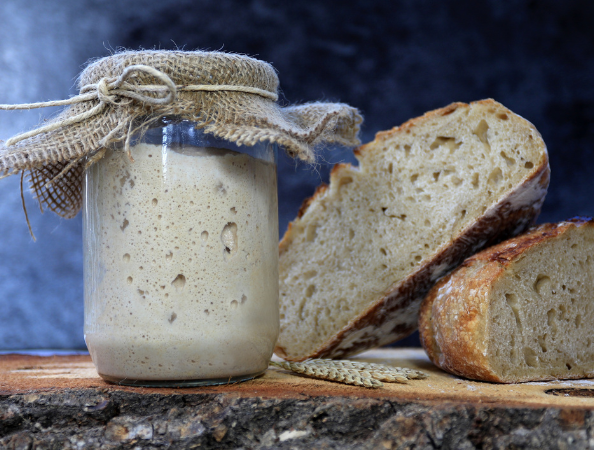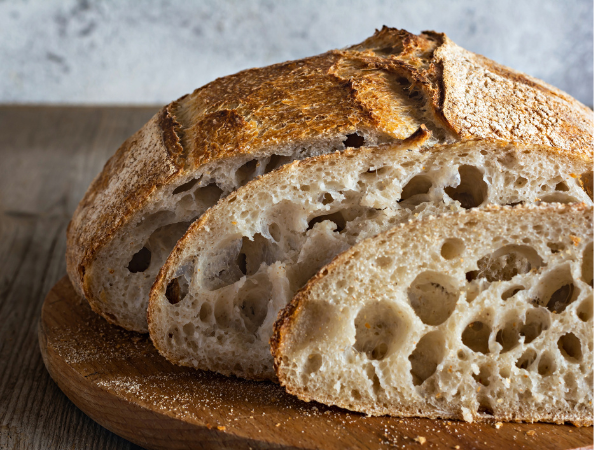Nutritionist explains the benefits of eating sourdough bread and its differences from normal bread

Artisanal bakeries have been incorporating new methods of production to improve the quality of their products. Among these changes, sourdough has become important due to its nutritional characteristics and its fermentation process.
This type of preparation influences the flavour, texture and preservation of the bread, which distinguishes it from conventional options.
Differences between sourdough bread and traditional bread Unlike regular bread, bread made with sourdough contains a higher amount of vitamins B1, B6, B12, thiamine, niacin and riboflavin . It also provides minerals such as magnesium, potassium, calcium, zinc, phosphorus, iron and selenium, as well as proteins and fatty acids.
Another aspect that sets it apart is the natural fermentation process, which allows it to be preserved for longer and reduces food waste. Its crumb also remains softer, whereas traditional bread tends to harden quickly.

Sourdough provides probiotics, regulates the glycemic index and facilitates gluten digestion. Photo: iStock
The sourdough preparation method requires only flour, water or some other liquid such as milk or yogurt, and lactic bacteria or yeasts present in the ingredients and the environment. At least 84 types of yeast, 700 wild yeast strains and 1,500 lactic bacteria have been registered in the library of Puratos, an international bakery company.
Historical records suggest that this type of bread was used as early as 3,700 BC in Egypt, where wild yeasts and lactic bacteria were used to produce lighter, more easily digestible breads.
Here are the benefits of sourdough bread
Glycemic index control Nutrition specialist Diana Castellanos Givaudan mentions that this bread helps regulate the glycemic index, which is useful for those with insulin resistance, thyroid problems or diabetes.
“Regular white bread has a glycemic index of 70, while sourdough bread has a glycemic index of around 50 and a maximum of 60, which is essential for patients with blood glucose problems. Eating it can cause fewer fluctuations in blood sugar levels, which means it can help balance them,” explains Castellanos.
Facilitates digestion The prolonged fermentation process allows microorganisms to break down gluten , making it easier to digest.
“As well as sourdough bread being a very good alternative for blood glucose, it is also much more digestible. And it can be even more so if you keep it in the fridge,” says Castellanos.
Contributes to the microbiota During fermentation, microorganisms are generated that can positively influence the intestinal microbiota . The nutritionist mentions that this process partially breaks down starches and some proteins such as gluten.
Chilling it increases the amount of resistant starch, which helps feed beneficial bacteria in the gut.

Although it facilitates the digestion of gluten, it is not suitable for celiacs because it does not eliminate this protein. Photo: iStock
Gluten is found in cereals such as wheat, barley and rye, but the fermentation process of sourdough weakens its structure.
Carlos Piña, R&D director at Puratos, clarifies: “It is important to understand that gluten is present in flour, but not as gluten; it is made up of two proteins, gliadin and glutenin. Once we add water and subject it to mechanical work, we form that network. When we subject it to a long fermentation process, we can make the gluten network weaken, which helps better digestion for people who may be sensitive, but it does not necessarily prevent these products from containing it.”
Piña stresses that sourdough bread is not suitable for those with celiac disease, as fermentation only partially breaks down gluten, but does not eliminate it completely.
Sena launched the first free baking school in Colombia | El Tiempo The Universal (Mexico) / GDA
More news in EL TIEMPO *This content was rewritten with the assistance of artificial intelligence, based on information from El Universal, and was reviewed by a journalist and an editor.
eltiempo






